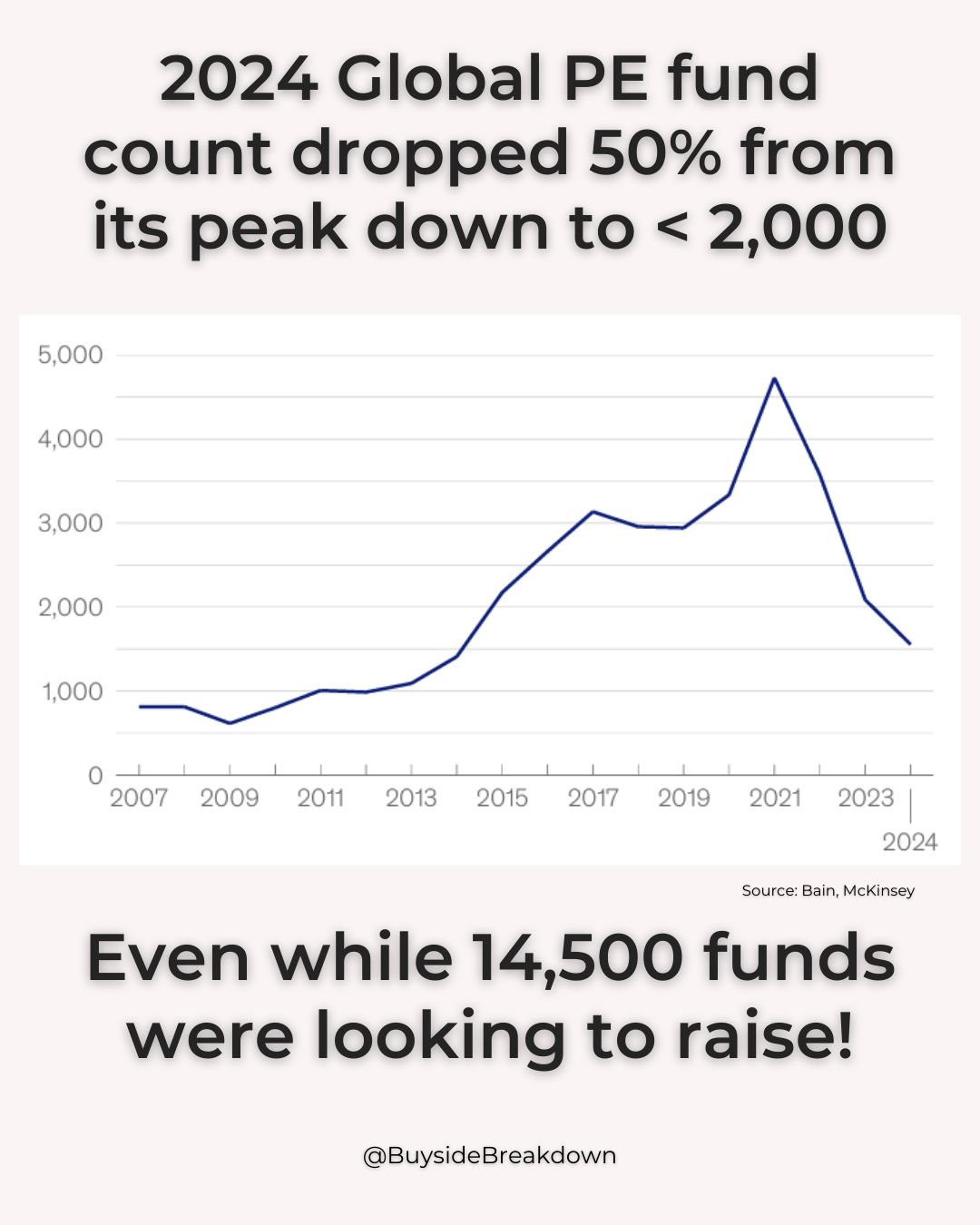- Buyside Breakdown
- Posts
- Is Now the Right Time to Start Your Own Private Equity Firm?
Is Now the Right Time to Start Your Own Private Equity Firm?
The private equity landscape is shifting: fundraising is down, competition is fierce, and LPs are tightening their wallets. Does a new firm stand a chance?
The private equity landscape has undergone a fundamental shift over the past few years. For professionals considering launching their own firm, the question of timing is crucial. While private markets continue to offer significant opportunities, fundraising challenges, increased competition, and shifting LP behavior have made it harder than ever for new entrants to establish themselves. This inaugural post examines whether now is the right time to start a private equity firm, drawing on recent industry data and market trends.

The Fundraising Landscape: A Difficult Market for First-Time GPs
The past decade saw a rapid expansion in private equity fundraising, peaking in 2021 with record levels of capital raised. However, since then, the market has slowed considerably. Global PE fundraising declined for three consecutive years, with 2024 volumes approximately 24% lower than 2023, which was already down 20% from the previous year. Limited partners (LPs) have become increasingly cautious, concentrating commitments to a smaller number of established managers. The number of funds reaching a final close has also dropped sharply, with nearly 55% fewer funds closing in 2023 compared to the 2021 peak. The slowdown in fundraising can be attributed to a combination of factors, including lower distributions from existing investments, economic uncertainty, and an oversupply of GPs chasing limited LP capital.
The LP perspective further underscores the difficulty of launching a new firm. While nearly 90% of LPs express willingness to consider first-time funds in principle, actual commitments tell a different story. In practice, LPs are prioritizing re-ups with established managers, particularly those with proven track records in navigating volatile market conditions. The largest buyout funds are absorbing a disproportionate share of new capital, making it increasingly difficult for new entrants to secure commitments. In 2023, the ten largest buyout funds accounted for roughly 26% of all capital raised, up from 17% just a few years prior. This consolidation of capital among elite firms leaves emerging managers with a shrinking pool of available LP commitments.

Competition and Market Saturation
Beyond fundraising challenges, the sheer volume of funds seeking capital presents another obstacle. As of early 2024, approximately 14,500 funds were actively in the market, collectively targeting $3.2 trillion in commitments. However, the industry is experiencing a significant imbalance between supply and demand—only about one dollar of commitments is closing for every $2.40 sought. This means that new fund managers are not only competing against well-established firms but also against an oversaturated market where LPs have more options than capital to allocate.
Emerging managers cite competition with established firms as their top fundraising challenge. LPs frequently have long-standing relationships with top-tier GPs and are hesitant to allocate capital to lesser-known managers without a compelling reason. This trend has created a "flight to quality," where the largest firms continue to attract capital while newer firms struggle to gain traction. The average fundraising timeline has also lengthened, with many funds now taking 18 to 24 months to close, compared to 12 to 14 months in prior years.

Is Now the Right Time to Start a PE Firm?
Given these market conditions, the decision to launch a private equity firm requires careful consideration. The data and sentiment suggest that now is not an ideal time for most would-be fund managers. The combination of a tougher fundraising environment, increased competition, and LP hesitancy toward emerging managers means that the bar for success is significantly higher than in previous years. LPs are demanding more from new GPs, including a proven track record, a differentiated investment thesis, and in some cases, pre-committed anchor capital.
However, this does not mean that launching a PE firm is impossible. Success in today’s market requires a highly specialized approach. First-time managers who have a deep sector focus, strong operating experience, or a unique investment edge may still find LP interest. Additionally, those with established networks and existing LP relationships are in a stronger position to secure commitments. The most viable path forward for many new entrants may be through a deal-by-deal structure, an independent sponsor model, or partnering with a platform before raising a dedicated fund.
Conclusion
For most professionals, now is not the best time to start a private equity firm. Fundraising conditions remain challenging, LPs are concentrating capital among established managers, and the competition for limited capital is intense. That said, for those with a highly differentiated strategy, a strong track record, and access to committed capital, opportunities still exist. The key takeaway is that the market has become increasingly selective, and only those who can demonstrate a clear edge will succeed in launching and scaling a PE firm in today’s environment.
